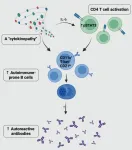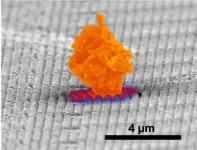New York, NY (February 22, 2023) – Scientists at the Icahn School of Medicine at Mount Sinai in New York have identified which parts of the immune system go awry and contribute to autoimmune diseases in individuals with Down syndrome. The findings published in the February 22 online issue of Nature [DOI: https://doi.org/10.1038/s41586-023-05736-y].
The work adds to the research team’s findings published in the journal Immunity in October 2022, showing that people with Down syndrome have less frequent but more severe viral infections.
Studying lab specimens from volunteers with Down syndrome, the investigators identified cytokines and a B cell subtype—key players in the adaptive immune response—as the potential culprits for most autoimmunity in people with the disorder.
Strikingly, the researchers found that many people with Down syndrome are in a perpetual state of inflammation comparable to those without Down syndrome who are in intensive care with an acute infection. According to the researchers, this leads to the breaking of immune tolerance, which results in autoimmunity.
“Our findings could be used to test existing therapies not commonly used in persons with Down syndrome and to develop potential therapeutics to alleviate autoimmunity symptoms in individuals with the disorder,” said Dusan Bogunovic, PhD, senior author of the study. “Available drugs such as tocilizumab and a variety of JAK inhibitors could potentially tame this inflammation. And in patients who have elevated autoimmune prone B cells, there is an opportunity to develop therapies targeting this cell type specifically.”
Dr. Bogunovic is a Professor at the Marc and Jennifer Lipschultz Precision Immunology Institute, and the Center for Inborn Errors of Immunity at Icahn Mount Sinai.
Down syndrome, the most common genetic condition diagnosed at birth, is typically caused by triplication of chromosome 21. Among other issues, people with Down syndrome suffer from autoimmunity, including hair loss, skin, gut, and thyroid problems. It is universally present across racial, gender, and socioeconomic lines in approximately 1 in 700 live births, although considerable variation exists worldwide.
“People with Down syndrome are an underserved population worldwide. They require the same level of dedication as all of us. We now have a better understanding of their health and are laying the groundwork to potentially use existing drugs and develop new ones, which could be transformative to their health,” said study first author Louise Malle, an MD/PhD candidate at Icahn Mount Sinai. “We also need to keep in mind that, just like in the general population, not all individuals with the disorder are the same, and there is significant variability.”
Next, the researchers plan to dive deeper into the causes of autoimmunity in Down syndrome and to help propel a formal randomized placebo-controlled clinical trial in which available drugs could best be tested in the clinical setting. In addition, the investigators intend to expand, more broadly, the field’s understanding of the disease.
The paper is titled “Autoimmunity in Down syndrome via cytokines, CD4 T Cells, and CD11c + B cells.”
Additional co-authors are Roosheel S. Patel (Icahn Mount Sinai); Marta Martin-Fernandez (Icahn Mount Sinai); O’Jay Stewart (Icahn Mount Sinai); Quentin Philippot (Inserm, Imagine Institute); Sofija Buta (Icahn Mount Sinai); Ashley Richardson (Icahn Mount Sinai); Vanessa Barcessat (Icahn Mount Sinai); Justin Taft (Icahn Mount Sinai); Paul Bastard (Inserm, Imagine Institute); Julie Samuels (Icahn Mount Sinai); Clotilde Mircher (Institut Jérôme Lejeune); Anne-Sophie Rebillat (Institut Jérôme Lejeune); Louise Maillebouis (Institut Jérôme Lejeune); Marie Vilaire-Meunier (Institut Jérôme Lejeune); Kevin Tuballes (Icahn Mount Sinai); Brad R. Rosenberg (Icahn Mount Sinai); Rebecca Trachtman (Icahn Mount Sinai); Jean-Laurent Casanova (Rockefeller University); Luigi Notorangelo (NIAID/NIH); Sacha Gnjatic (Icahn Mount Sinai); and Douglas Bush (Icahn Mount Sinai).
The work was funded by the National Institute of Allergy and Infectious Diseases Grants R01AI150300, R01AI150300-01S1 and R01AI151029. Louise Maillebouis was supported by the National Institute of Child Health and Human Development T32 training grant T32HD075735. Luigi Notorangelo is supported by the Division of Intramural Research, National Institute of Allergy and Infectious Diseases, NIH.
Dr. Bogunovic is the founder of Lab11 Therapeutics.
-####-
About the Icahn School of Medicine at Mount Sinai
The Icahn School of Medicine at Mount Sinai is internationally renowned for its outstanding research, educational, and clinical care programs. It is the sole academic partner for the
eight member hospitals* of the Mount Sinai Health System, one of the largest academic health systems in the United States, providing care to a large and diverse patient population.
Ranked No. 14 nationwide in National Institutes of Health funding and in the 99th percentile in research dollars per investigator according to the Association of American Medical Colleges, Icahn Mount Sinai has a talented, productive, and successful faculty. More than 3,000 full-time scientists, educators, and clinicians work within and across 34 academic departments and 44 multidisciplinary institutes, a structure that facilitates tremendous collaboration and synergy. Our emphasis on translational research and therapeutics is evident in such diverse areas as genomics/big data, virology, neuroscience, cardiology, geriatrics, and gastrointestinal and liver diseases.
Icahn Mount Sinai offers highly competitive MD, PhD, and master’s degree programs, with current enrollment of approximately 1,300 students. It has the largest graduate medical education program in the country, with more than 2,600 clinical residents and fellows training throughout the Health System. In addition, more than 535 postdoctoral research fellows are in training within the Health System.
A culture of innovation and discovery permeates every Icahn Mount Sinai program. Mount Sinai’s technology transfer office, one of the largest in the country, partners with faculty and trainees to pursue optimal commercialization of intellectual property to ensure that Mount Sinai discoveries and innovations translate into health care products and services that benefit the public.
Icahn Mount Sinai’s commitment to breakthrough science and clinical care is enhanced by academic affiliations that supplement and complement the School’s programs. Through Mount Sinai Innovation Partners (MSIP), the Health System facilitates the real-world application and commercialization of medical breakthroughs made at Mount Sinai. Additionally, MSIP develops research partnerships with industry leaders such as Merck & Co., AstraZeneca, Novo Nordisk, and others.
The Icahn School of Medicine at Mount Sinai is located in New York City on the border between the Upper East Side and East Harlem, and classroom teaching takes place on a campus facing Central Park. Icahn Mount Sinai’s location offers many opportunities to interact with and care for diverse communities. Learning extends well beyond the borders of our physical campus, to the eight hospitals of the Mount Sinai Health System, our academic affiliates, and globally.
-------------------------------------------------------
* Mount Sinai Health System member hospitals: The Mount Sinai Hospital; Mount Sinai Beth Israel; Mount Sinai Brooklyn; Mount Sinai Morningside; Mount Sinai Queens; Mount Sinai South Nassau; Mount Sinai West; and New York Eye and Ear Infirmary of Mount Sinai.
END


